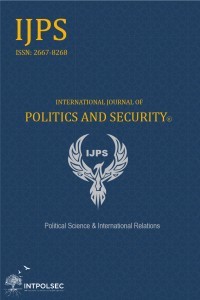Evaluation of the Systemic Balance in the Arctic within the Context of Neorealism and Regional Security Complex
Arktik, iklim değişikliği ile mücadele çerçevesinde üzerinde önemle durulan bir bölgedir. Bu hususta işbirliği adımları görülüyor olsa da bahsedilen adımlar bölgenin ekonomik ve ticari potansiyeli özelinde yürütülen tartışmaların gerisinde kalmaktadır. Arktik Konseyi gibi yapılar bölgede toplum ve çevre temelinde bir işbirliği sürecini şekillendirmek istemektedir. Ne var ki, ABD ve Rusya arasında süregelen çatışmacı ilişkiler ağı Arktik bölgesiyle ilgili tartışmaları, çabaları ve aktörleri de doğrudan etkilemektedir. Bölgede neorealist temelde bir güç dengesinin oluştuğu görülebiliyor olsa da Çin gibi yeni aktörlerin Arktik’e entegre olması dengeyi ortadan kaldırabilir. Bu çerçevede, Buzan’ın betimlediği askeri, siyasal ve ekonomik güvenlik sektörleri, orta vadede Arktik’teki ilişkiler ağını şekillendiren en önemli unsurlara dönüşebilir. Esas güvenlikleştirme unsurları olması gereken toplumsal ve çevresel güvenlik sektörlerinin geri plana itilmesi ise bölge adına olumsuz bir görünüm yaratacaktır.
Anahtar Kelimeler:
Küresel Isınma, Kuzey Deniz Yolu, Enerji, Kıta Sahanlığı
Evaluation of the Systemic Balance in the Arctic within the Context of Neorealism and Regional Security Complex
Arctic is a region that is emphasized within the framework of combating climate change. Although there are steps of cooperation in this regard, the mentioned steps fall behind the discussions on the economic and commercial potential. Structures such as the Arctic Council want to shape a social and environmental cooperation process in the region. However, the ongoing network of conflictual relations between the US and Russia directly affects the discussions, efforts and actors regarding the Arctic. Although it can be seen that a balance of power has been formed on a neorealist basis, the integration of new actors such as China into the Arctic can eliminate the balance. In this framework, the military, political and economic security sectors described by Buzan may turn into the most important elements that shape the network of relations in the Arctic in the medium term. Leaving the social and environmental security sectors, which should be the main securitization elements, to the background will create a negative outlook for the region.
Keywords:
Global Warming, Northern Sea Route, Energy, Continental Shelf,
___
- Griffiths, Ryan D., “The Waltzian Ordering Principle and International Change: A Two-Dimensional Model”, European Journal of Interrnational Relations, Vol. 24, No. 1 (2017): 130-152.
- Havnes, Heljar, “The Polar Silk Road and China’s Role in Arctic Governance”, Journal of Infrastructure, Policy and Development, Vol. 4, No. 1 (2020): 121-138.
- Herz, John H., “Idealist Internationalism and the Security Dilemma”, World Politics, Vol. 2, No. 2 (1950): 157-180.
- Hsiung, Christopher Weidacher, “China and Arctic Energy: Drivers and Limitations”, The Polar Journal, Vol. 6, No. 2 (2016): 243-258.
- Huysmans, Jef, “The European Union and the Securitization of Migration”, Journal of Common Market Studies, Vol. 38, No. 5 (2000): 751-777.
- ISSN: 2667-8268
- Yayın Aralığı: Yılda 2 Sayı
- Başlangıç: 2019
- Yayıncı: Fikret BİRDİŞLİ
Sayıdaki Diğer Makaleler
Kuşak ve Yol Girişimi Bağlamında Çin’in Arktik Politikası
Arktik Bölgesinin Kopenhag ve Aberystwyth Ekolü İle İncelenmesi
Climate Change and Hard-Soft Security Nexus: Future of Arctic Security Cooperation
Evolving Arctic Security Architecture Towards a Cooperative One
Importance of the Arctic in the Framework of Air Power Theory
Arktik Bölgesinde Yaşanan Güncel Sorunlar ve İkili Anlaşmazlıklar
Arktik Bölgede Çevresel Bozulma, Strateji ve Rekabet: Çevresel Güvenlik Bağlamında Bir Değerlendirme
İsmail Utku CANTÜRK, Senem ATVUR
Arktik Yerli Halkları için İnsan Güvenliği Sorunu Olarak İklim Değişikliği
Tarihten Bugüne Rusya'nın Arktik Politikaları: Değişimler ve Süreklilikler
